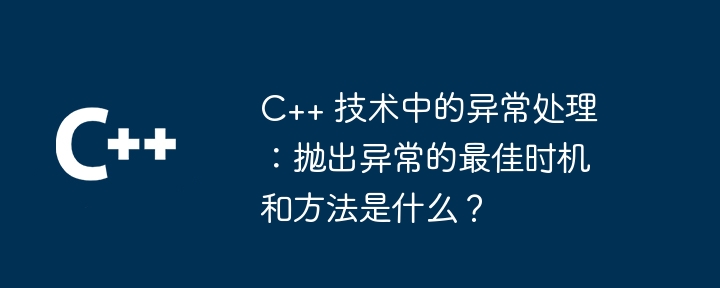Home >Backend Development >C++ >Exception handling in C++ technology: What is the best time and method to throw an exception?
Exception handling in C++ technology: What is the best time and method to throw an exception?
- WBOYWBOYWBOYWBOYWBOYWBOYWBOYWBOYWBOYWBOYWBOYWBOYWBOriginal
- 2024-05-09 18:39:02579browse
Exception handling is used to handle unrecoverable errors in C. The best time to throw is: memory allocation failure; file operation failure; database connection failure; invalid parameters. C provides a variety of methods for throwing exceptions: throw expressions, throw exception objects, and using throw macros. Best practices include throwing only unrecoverable errors, providing error descriptions, using custom exception objects, and catching all exceptions.

Exception handling in C technology: the best time and method to throw
Exception handling is the processing of errors and exceptions in C a mechanism of the situation. This article explores when and how to throw exceptions to ensure code robustness and maintainability.
Best time to throw
Exceptions should be thrown only when an unrecoverable error or abnormal situation is encountered. The following are some common situations:
- Memory allocation failed
- File opening or reading failed
- Database connection failed
- Invalid parameter
Methods for throwing exceptions
C provides a variety of methods for throwing exceptions:
- throw expression; : Directly throw the value produced by the expression.
- throw exception object; : Throws an exception object that provides additional information about the error.
-
Use throwing macros; : Such as
std::runtime_error()andstd::invalid_argument(), these macros throw standard Exception object.
Practical case
Consider the following function to open a file:
File openFile(const std::string& filename) {
File file;
if (!file.open(filename)) {
throw std::runtime_error("Could not open file: " + filename);
}
return file;
}If the file fails to open, we will use throw The expression throws a std::runtime_error exception.
Best Practices
- Throw only unrecoverable errors.
- Provide a clear description of the error.
- Use custom exception objects to provide more context.
- Use standard exceptions whenever possible.
- Catch all exceptions (even just to log the error).
The above is the detailed content of Exception handling in C++ technology: What is the best time and method to throw an exception?. For more information, please follow other related articles on the PHP Chinese website!

